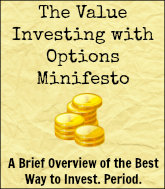Best Option Strategies
3 Profitable Option Trades
In the quest for the best option strategies, I have discovered that there are many ways to lose money trading options (trust me, I know what I'm talking about in that regard).
It would be helpful if we were given multiple lifetimes in which to perfect our methods of trading and investing. Unfortunately, all we have is this life and the present moment. And that means a lot of trial and error.
But trial and error doesn't mean that you must make the same mistakes as everyone else.
Or the same number.
A large part of the trial portion consists of educating yourself in order to cut down on the error portion. And the purpose of educating yourself, when it comes to option trading, is to eliminate as many potential mistakes as possible beforehand.
Option Trading Warning
In your own quest for the best option strategies, the biggest potential mistake you want to eliminate beforehand is adopting a trading or investing philosophy that doesn't actually suit you.
For example, I know myself well enough now to realize that pure speculative trading does NOT suit my personality (although, from time to time, I'm still tempted).
That's not a slam on trading or traders. On the contrary, I have tremendous respect for those who are capable of trading either for a living or for a significant portion of their income. It absolutely can be done. But it takes the right person with the right mixture of analytical intelligence, technical training, and psychological fortitude to succeed.
If you really are drawn to a more trading-centric approach, I can confidently recommend a couple of free, high quality, and trustworthy websites that will help you immensely: www.online-stock-trading-guide.com and www.swing-trading-options.com.
The Hybrid Investor-Trader
I suspect, however, that there are a lot of people out there like me. We may not have the pure mathematical skills to ever become great, professional, full-time traders, and even if we could be successful at it, we still lack the necessary personality to even want to be great, professional, full-time traders.
But we're not content with a simple buy and hold strategy either. It's not that we're necessarily impatient; it's just that buy and hold by itself doesn't work (although buy and hold and cheat does).
The idea of investing via mutual funds or ETFs is also unappealing. It seems wrong somehow, a waste of potential, and boring as hell. Oh, and one other thing - it doesn't work any better than straight buy and hold.
Additionally, we're not the kind of people who abdicate our investing either, who simply hand over our money and let someone else manage it for us, just spare us the details, ala Bernie Madoff.
We may not be pure traders, but we recognize that the details are still important.
The 3 Best Option Strategies for Everyday Traders/Investors
I suppose, at heart, I'm some kind of quasi structuralist. I tend to see the structure as much as the details (the forest and the trees, if you will). Be it works of art, political campaigns, or option strategies, I'm interested in studying how intangible things are designed and why they work (or why they don't).
So I've actually thought a great deal about what the best option strategies are from a structural standpoint.
- Are there effective option trading strategies that don't require professional grade expertise with technical analysis?
- Are there any relatively simple option strategies or methods available to increase one's returns without having to take excessive risks?
- If these strategies exist and if they're effective, what makes them effective?
Full disclosure - what follows are my own subjective opinions, formed out of my own personal experiences and biases:
From a structural standpoint, I can identify three separate TYPES of option strategies that can be very profitable for the everyday trader. The one common trait these methods share is that at some level, in full or in part, they rely on selling time premium:
- Method #1 - Leveraged Investing
- Method #2 - Writing Covered Call Options for Income
- Method #3 - Calendar Spread Trading
Tweet
Follow @LeveragedInvest

